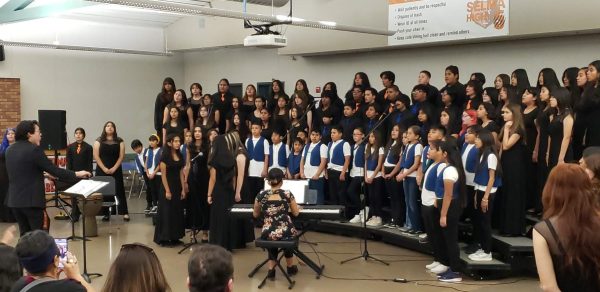Learning What’s On Your Ballot
October 25, 2020
The proposition section is often the most overlooked section on the ballot. Though it is considered to be the most intimidating step in the voting process, what many don’t know is that being an informed voter only takes a few steps of research. This year California has 12 official propositions certified to be up for election. Here is how each ballot initiative is described:
Proposition 14 (Stem Cell Research Institute Bond Initiative), is a bond issue and stem cell initiative that is on the ballot. A vote “yes” on this initiative would support the issuing of $5.5 billion for general obligation bonds for the California Institute of Regenerative Medicine (CIRM), as they ran out of funds from the previous proposition last year. A vote “no” for this proposition would oppose the issuing of those funds. The ballot initiative would require CIRM to spend no more than 7.5 percent of the bond funds on operation costs. The remaining bond funds would be spent on grants that conduct research related to stem cells, as well as facility start-up costs. $1.5 billion of the bond funds would be used for research on brain and nervous system diseases such as Alzheimers and Parkinson’s Disease.
Proposition 15 is a ballot initiative that involves taxes, education funding, and is labeled as a constitutional amendment in California. A vote “yes” for this proposition would increase funding for K-12 public schools through the taxation of commercial and industrial properties by their market value and not the price at which they were purchased. The initiative would exclude certain properties labeled as commercial agriculture and would also exempt small businesses from property taxes. If you vote “no”, opposing this amendment, would vote for continuing to tax property based on the property’s purchase price, with annual increases to the rate of inflation.
Proposition 16 is on the ballot as a legislatively referred constitutional amendment that would permit the government to make policies considering the race, gender, ethnicity, or national origin. If passed this would repeal Article 1, Section 31 of the California State Constitution (added by prop. 209 in 1996) that banned the use of affirmative action in public employment, public education, and public contracting. This amendment would not change other state and federal laws prohibiting fraudulent discrimination.
Proposition 17 is on the California Ballot as “Voting Rights Restoration for Person on Parole Amendment”. If voted “yes” this would allow those who have completed their felony sentences and are now on parole to vote. Currently California law states that any person with a felony conviction has to wait until both their sentences and their parole is completed in order to qualify to vote. The monetary impact statement of this initiative is “Increased annual county costs, likely in the hundreds of thousands of dollars statewide, for voter registration and ballot materials.” and an increased one-time state cost for updating voter registration cards and systems.
Proposition 18 is also a suffrage proposition. This ballot initiative would permit 17-year-olds, who will be 18 by the time of the next general election, voting rights for primaries and special elections. A vote “no” for this proposition would be in opposition of this. One thing to note is that 18 other states, as well as Washington D.C., allow those who would be 18 by the time of the next election, to vote in these elections.
Proposition 19 is a ballot initiative on the subject of taxes. A vote “yes” for this proposition would allow those eligible to transfer their residence tax to a replacement residence anywhere in California. It would also increase the number of times that people over 55 and those with severe disabilities can transfer their tax assessments from one to three. A vote “no” for this proposition would oppose the later, and would oppose the wild fire protection services fund.
Proposition 20 or Criminal Sentencing, Parole, and DNA Collection Initiative is labeled as a state statute. This proposition would limit access to parold for certain offenses if persons have completed their sentence. It also would classify certain theft crimes that are considered misdemeanors, as felonies, require DNA samples for certain misdemeanors, and increase correctional and law enforcement costs up to 10 million dollars annually. This ballot measure was designed to change previous propositions efforts for reducing the state’s prison population.
Proposition 21 is called Local Rent Control Initiative. If passed, this proposition would change state law to allow local governments to establish rent control for residential properties that are over fifteen years old. It would make an exception for landlords who own more than two properties that meet certain credential requirements.
Proposition 22 is labeled under the topic of Business Regulation and Labor Unions on this year’s ballot. A vote “yes” for this Prop would support defining rideshare and delivery services as independent contractors which would exempt them from various CA employment laws. A vote “no” would oppose this, leaving this vote up to the California Assembly Bill 5 to determine how to label these workers.
Proposition 23 is the only healthcare proposition on the ballot this year, and it consists of requiring at least one physician at kidney dialysis clinics, with exemptions given by the California Department of Public Health to those with a shortage of Physicians, changing the requirement to at least one NP or PA on site. This ballot measure would prohibit clinics from receiving treatment based on patient payment source, and would also prohibit the closing of a clinic without state approval.
Proposition 24 is a Business regulation ballot measure, and if voted “yes” would increase consumer data privacy laws to prevent businesses from sharing personal information. This would also establish a California Privacy Protection Agency to enforce and possibly issue fines. This proposition would also allow commercial credit agencies to sell and buy small businesses’s information.
Proposition 25, labeled on the topic of civil and criminal trials, deals with the bail system. This ballot measure would replace cash bail with a system based on safety and flight risk. This would also limit detention of a person in jail before trial for most misdemeanors.
Proposition voting can be intimidating, but you should always be informed. It is highly encouraged to do your own research before voting, to make sure you know what you are voting for.
(Sources: https://ballotpedia.org/California_2020_ballot_propositions









Lovleen • Nov 6, 2020 at 11:13 am
Great article! I loved learning about the propositions! I totally agree with you that we should be fully informed and aware of propositions before voting!
Ari Matias • Nov 6, 2020 at 12:53 am
I enjoyed learning about the new propositions and what it would mean if they gets passed/denied. I liked how you made things really easy to understand while still being very thorough!